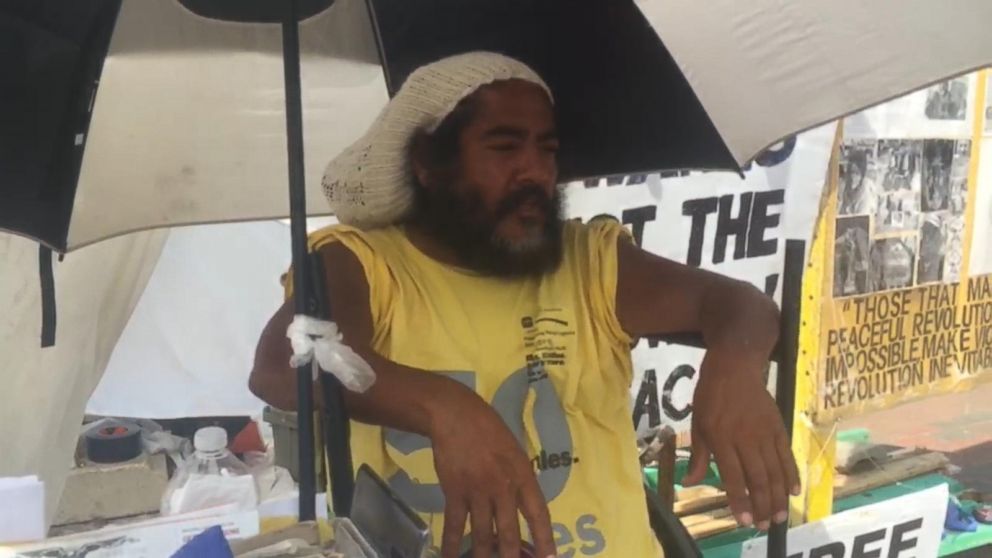Meet Obama's Closest Neighbor at '1601 Pennsylvania Avenue'
Peace activist Philipos Melaku-Bello continues a 35-year tradition.
— -- Meet President Obama’s closest neighbor.
Just across the street from 1600 Pennsylvania Avenue sits a modest white tent at the edge of Lafayette Square that supporters have taken to calling “1601 Pennsylvania Avenue.” Just outside the tent sits Philipos Melaku-Bello, a peace activist who, along with a group of volunteers, keeps vigil at the tent 24 hours a day, 7 days a week.
And it has been going on this way for 35 years.
Melaku-Bello is continuing what is widely recognized as the longest continuous protest in U.S. history, just feet away from the nation’s highest office. For over three decades, the encampment has served as an anti-war protest against the use of nuclear weapons.
The vigil is for “world peace, against nuclear and atomic weapons, against human rights violations,” Melaku-Bello told ABC News.
Sitting beneath a large umbrella, Melaku-Bello is flanked by harrowing photos of children affected by nuclear radiation, and a bright yellow sign that reads “Live By The Bomb, Die By The Bomb.”

Melaku-Bello is the primary caretaker of the "peace camp" first established by activist William Thomas, who began the vigil in August 1981 to promote peace and love in the face of nuclear proliferation. Thomas, who died in 2009, was joined in the effort by a group of supporters and, prominently, a woman by the name of Concepcion Picciotto, who became the primary caretaker of the encampment until she died in January. Melaku-Bello has taken primary responsibility for the vigil since Picciotto's death.
Come rain or shine, blizzard or hurricane conditions, Melaku-Bello and a team of volunteers keep constant watch over the encampment.
“What do we do? We survive,” Melaku-Bello said of how he and his team endure sometimes harsh weather conditions. “We’re protesting so that nobody else will have to die by the hands of any country’s military.”
One of the tent volunteers must be present around the clock, or the Secret Service has the authority to remove the encampment. There has been at least one incident where a volunteer left the tent unattended overnight in 2013, resulting in the camp's temporary destruction before it was again allowed to be resurrected. And every four years, the structure is temporarily moved back a ways for the presidential inauguration parade.
As for his interactions with the neighborhood commander-in-chief, Melaku-Bello wouldn't disclose which, if any, presidents have actually made the short walk across Pennsylvania Avenue to acknowledge the activists' presence. But he does have a favorite former neighbor: “The one that has been most receptive is Bill Clinton,” Melaku-Bello said of the 42nd president.
Of his current neighbor, he said, “there’s another 70 percent of what Barack Obama does that I love,” though adding that he is not pleased with the president’s increase in military funding for nuclear weapons.
As for the Obama’s Nobel Peace Prize, “I should have gotten it! Concepcion should have gotten it,” he joked.
The vigil’s message has also been heard in Congress. Each year since 1994, Rep. Eleanor Norton, D-D.C., has introduced a version of the “Nuclear Disarmament and Economic Conversion Act” (HR 1976), advocating for the dismantlement of nuclear weapons around the world.
Melaku-Bello hopes the vigil will continue to inspire the next generation and motivate action against nuclear warfare.
“Talk to your congressman. Talk to your senator,” he said. “Tell them to sign HR 1976 for the United Nations to eliminate nuclear weapons from the face of the Earth.”